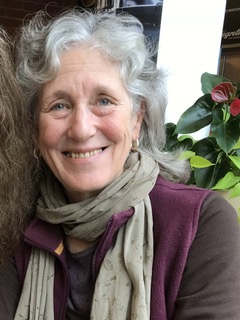Dispatch #4
From Berlin, December 10, 2018
Anna Gyorgy
This is the fourth in a series of dispatches to the Montague Reporter and Traprock Center for Peace & Justice by Wendell resident Anna Gyorgy, reporting from Berlin.
Is Change Coming? (The Climate Won’t Wait)
Reports from Poland and France: Katowice and the COP24 climate conference

The fear that restrictive legislation passed by Poland’s right-wing government in early 2018 would be used to stifle climate activism at this year’s UN climate conference,
has been realized.
On December 7th, the Climate Action Network (CAN) of 1,300 environmental non-governmental organizations at the conference being held in Katowice from December 2-14. objected that Polish authorities had prevented at least 12 civil society group members from attending.
May Boeve, Executive Director of 350.org, one of the CAN groups, said: “From what we understand the reasons for refusing entry are due to allegations that they are a ‘threat to national security’.” The German daily newspaper taz reported that three leading members of the Ukrainian environmental group Ecoaktion, a partner of leading German environmental organizations, were also denied entry at the border.
The annual demonstration for climate action was, quite different from the peaceful, spirited event last November in Bonn, which attracted some 30,000 people. On Saturday, December 8, around 4,000 people marched through city streets, surrounded by a contingent of 1,500 police in ‘robo-cop’ attire, with water cannons at the ready.
Meanwhile, inside the UN conference delegates sparred for almost 3 hours Saturday over wording on the Intergovernmental Panel on Climate Change’s (IPCC)
recent findings on the dangers of global warming above 1.5 degrees Celsius (2.7°F). Should the conference report “welcome” the scientific conclusions, or just “note” their report? The bombshell report had been requested by the UN conference in 2015. Its conclusions were that to keep average planetary warming under 2.7°F, CO2 emissions would have to be cut at least in half by 2030. So how it was received meant a lot to both fossil fuel supporters and opponents.
Saudi Arabia, the USA (despite Trump’s withdrawal, still legally part of the COP process until 2020), Russia and Kuwait supported just ‘noting’ the report, while a broad coalition of other countries thought it should be “welcomed”, and thus taken seriously. The result, recorded by the taz was: “no agreement; the subject was postponed to the next conference.” This kind of argumentation and blocking reflect why the UN climate conference process has been so slow and ineffective for more than two decades.
In Katowice, a city in a major coal area that is slowly weaning itself from open coal heaters and power plants, the ongoing struggle between the fossil past and the solar transition is clearer than ever. But the fight over what green energy will look like goes beyond opposing coal.
There is also opposition to a new generation of major international European gas pipelines and infrastructure, as well as a movement against accepting burning of wood as a source of ‘green energy.’
More on that can be found in CAN’s “One Week Down” digital newsletter (http://eco.climatenetwork.org/cop24-eco6/), which also announced the arrival of the Climate Pilgrims to COP24. The group, which started its pilgrimage at the Vatican on October 4, walked some 950 miles through seven countries, holding climate-related workshops and meetings in local communities. In Katowice they are calling on the COP24 delegates “to respond to the recent IPCC report and take ambitious action to keep global warming to 1.5°C (2.7’ F).”
After researching and writing this article, based in Berlin, I watched Democracy Now!’s first day of reporting from Katowice. Amy Goodman and colleagues are there for the second week of the COP, as in years past, and as before their coverage is impressive. For daily reports from Katowice and COP24, do check their December 10-14 programs at www.democracynow.org/
“Yellow Vests” continue protests in France
While the sky may be clouded by smoke from coal fires in Katowice, tear gas spread over parts of central Paris on past weekends, as police struck against blockades and demonstrations spreading across the country.
These concern climate policies too. For the mass protests, with violence from the “forces of order” as well as some among the demonstrating crowds, began in reaction to an increased tax on diesel fuel. This was part of a series of reforms from French President Emmanuel Macron to encourage people to drive less, buy more efficient cars, and submit to more rigorous emissions tests. In other words, it was part of his plan for an energy transition away from fossil fuels.
The yellow vests worn by protesters are required in all French cars in case of emergency. For many living outside the urban centers with their relatively good public transportation this tax and price increase was an emergency, seen as a dictate from above by a government of and favoring the rich. The well-off had received tax breaks, while those struggling to get by had to bear yet another tax imposed from above. As the Brussels-based author of a long analysis on the movement put it, “President Macron’s climate policy is only apparently ecological, but is above all anti-social.”
Opposition to what was seen as an unfair tax has broadened into a major social movement against economic injustice and lack of democracy, with political groups from both the right and left supporting and trying to define the goals of the movement. The situation in France will continue to develop, but, parallel to the international climate convention going on in Poland, it sends a message to all national leaders that solving or even addressing the climate crisis cannot be done through heavy-handed, undemocratic actions from above.
